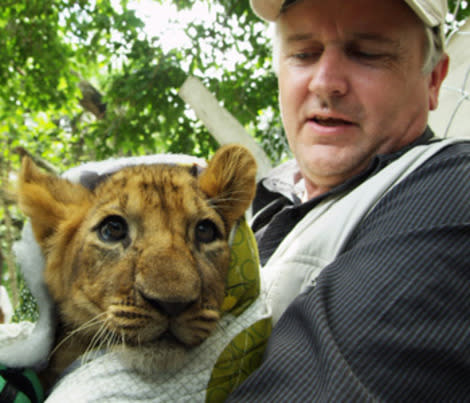Man Quits Finance Job, Makes Heart-racing Documentary About Rescuing Animals

In the spring of 2009, Bolivia banned animals in circuses, but not all circuses complied with the law. In 2011, animals were still being crammed into cages, mistreated, malnourished and neglected. Enter Jan Creamer and Tim Phillips, the married co-founders of Animal Defenders International (ADI), who spent two years investigating circuses undercover before mounting a rescue operation that succeeded in saving 25 lions from a miserable life in captivity.
Their efforts are documented in the film they made about it, "Lion Ark," which has been winning awards and accolades on the film festival circuit and is now playing in California and New York. It has also benefited from some Hollywood support: actress Jorja Fox of "CSI," an associate producer, helped on the filmmaking side, and animal activist Bob Barker was the biggest single donor, funding the lion's share (literally) of the $1.8 million rescue mission - including food, building a temporary sanctuary in Santa Cruz, Bolivia, and airlifts to America, not to mention the time spent undercover. The 25 lions were transported to the Wild Animal Sanctuary in Keenesburg, Colo., northeast of Denver. "They've got these huge habitats that allow big groups of lions to live as they would in nature," says Phillips. "It's open to the public so it's possible to go and see them. You walk through it on high walkways above the animals," he notes. "Besides the lions, they've got bears, tigers, lions, wolves. They just rescued a huge herd of alpacas."
Phillips, who quit his finance job when he saw a film about the mistreatment of animals in factory farms in 1981, "decided to do something useful," photographing animals in similar situations and "working my way toward animal protection." For Creamer, "it started 30 years ago when someone gave me a leaflet in the street." She started as a volunteer, and became a full-time activist once "I realized it was more important than what I was doing."
Also see: 10 odd ways to protect endangered species
Although the Bolivian lions are settled in Colorado, there is plenty of rescue work to be done, most imminently in Peru, which has passed a ban on wild animal circuses. "The government has asked us to do the same job we did in Bolivia, the Columbian government as well," says Creamer. "They're looking for help with enforcement. Governments don't want to pass laws they can't enforce and then look weak. We help the governments with enforcement so that they have legislation they know can be enforced. Otherwise you have anarchy."
Right now ADI field officers are working with regional authorities in Peru to track down circuses and take a census of the circus animals "so we know what we'll be dealing with," Creamer says. The current lion count is 17, and they hope to airlift them out early next year. "We're fundraising now. It will take about a million dollars," to cover a temporary shelter there, food, veterinary care, transport and building facilities in the U.S.
Phillips notes that more than 20 countries have passed or have pending legislation banning wild animals in circuses, including Austria, Croatia, Greece, Costa Rica, El Salvador, and the United Kingdom. "Passing legislation saying 'this must not happen anymore' is indicative of an incredible social change in the issue of how animals should be treated," says Phillips.
As for U.S. legislation, the proposal would cover exotic wild animals - some 300 individuals at last count - and ADI is working toward getting 100 members of Congress to get on board so it can be reintroduced in the next session. Phillips points out that it took three tries before the Bolivian bill passed in its Congress. "Animal protection legislation is never at the top of the political agenda. Economic, health, educational issues knock animal protection bills off course." With the government shut down, Obamacare crisis, and budget woes, "We thought it was best to let things settle down a bit after the holidays, and then get them talking about animal issues," adds Creamer.
Meanwhile, they're continuing to raise funds for the care of the lions they've rescued and the ones yet to come while seeking wider exposure for "Lion Ark" beyond film festivals . "We'd like to see it released in theaters and then TV, DVD. It's important to us as an organization for the film to be out there," says Creamer. For Phillips, the fact that "Lion Ark" won Best Documentary at the Sun and Sand Festival in Mississippi, the Audience Choice award at the San Diego Film Festival and sold out showings at other fests in London, Denver and Mill Valley, California indicates that "there is an audience for this film. It's had a fantastic response so far, and we're very pleased."
Related stories:
